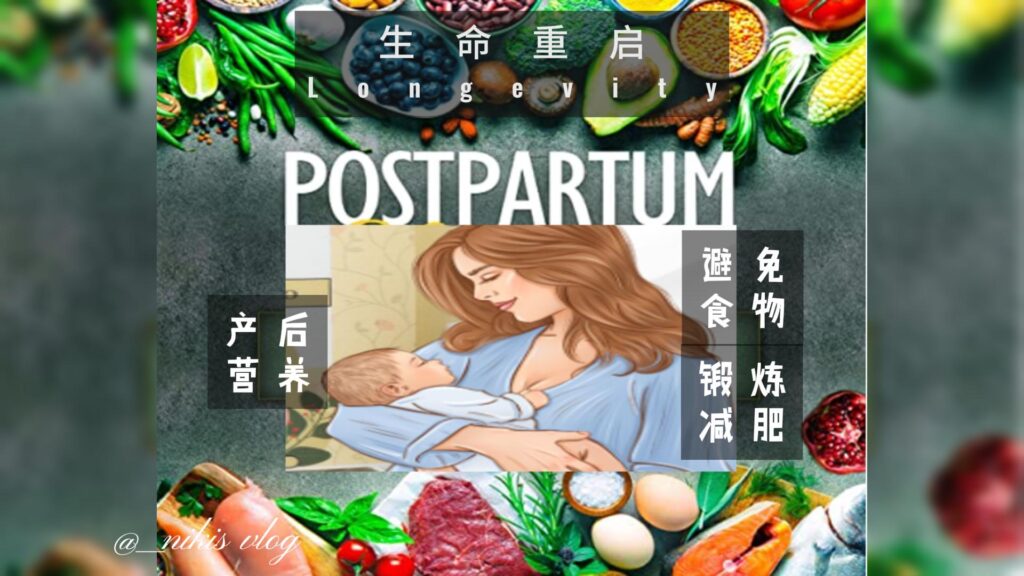
Postpartum diet
Postpartum diet and exercise play crucial roles in helping new mothers recover from childbirth, regain strength, and promote overall well-being. Here are some key considerations:
- Nutrient-Rich Diet: for breastfeeding mothers including:
- Lean Protein: Protein is essential for tissue repair, healing and muscle recovery.
- Healthy Fats: Omega-3 fatty acids are important for brain health and may also help reduce inflammation such as avocados, nuts, seeds, and fatty fish like salmon and mackerel.
- Fruits and Vegetables: Colorful fruits and vegetables are packed with vitamins, minerals, and antioxidants that support overall health and immune function in both fresh and cooked.
- Whole Grains: Whole grains provide fiber and energy to keep you feeling full and satisfied such as brown rice, quinoa, oats, barley, whole wheat bread, and whole grain pasta.
- Hydration and Soup: Drink plenty of water throughout the day, and soup that include hydrating foods like fruits and vegetables with high water content.
- Snacks: Choose nutrient-dense snacks to keep energy levels up between meals.
- Herbs and Spices: ginger can help with nausea and inflammation, while turmeric has anti-inflammatory properties.
2. Caloric Intake: Consuming enough calories is important, especially for breastfeeding mothers, but it’s essential to strike a balance to avoid excessive weight gain. Nursing women need about 500 extra calories each day, as well as plenty of protein, calcium and fluids to stay healthy and produce nutritious breast milk.
3. Timing of Meals: establishing a routine and prioritizing self-care, including regular meals and snacks, is important for maintaining energy levels and overall health.
4. Super-Foods for New Moms: Salmon, Blueberries, Brown Rice, and Eggs. Eggs are an ideal food for breastfeeding mothers. They contain a wide range of nutrients, including folate, vitamin D, iodine, selenium, choline and long-chain omega-3 fatty acids.
5. Dairy or Dairy Alternatives: Calcium-rich foods are important for bone health, especially for breastfeeding mothers like milk, yogurt, and cheese, or opt for fortified dairy alternatives like almond milk or soy milk.
6. Iron-Rich Foods: Iron is important for replenishing iron stores lost during childbirth and preventing postpartum fatigue. Here are some examples of iron-rich foods:
- Lean Red Meat: Beef, lamb, and pork are excellent sources of heme iron, which is more easily absorbed by the body compared to non-heme iron found in plant-based foods.
- Poultry: Chicken and turkey are good sources of heme iron, providing a significant amount of this essential nutrient.
- Seafood: Certain types of seafood, such as oysters, clams, shrimp, and sardines, are rich in heme iron and other nutrients like omega-3 fatty acids.
- Beans and Lentils: Legumes like lentils, chickpeas, black beans, kidney beans, and soybeans are high in non-heme iron, as well as fiber and protein.
- Tofu and Tempeh: These plant-based protein sources are rich in iron and can be included in a variety of dishes, such as stir-fries, salads, and soups.
- Fortified Breakfast Cereals: Many breakfast cereals are fortified with iron and other essential nutrients. Choose whole grain cereals with added iron for a convenient and nutritious breakfast option.
- Dark Leafy Greens: Spinach, kale, Swiss chard, collard greens, and other dark leafy greens are packed with non-heme iron, as well as vitamins, minerals, and antioxidants.
- Nuts and Seeds: Certain nuts and seeds, such as pumpkin seeds, sesame seeds, almonds, and cashews, are good sources of iron, along with healthy fats and other nutrients.
- Dried Fruit: Raisins, apricots, prunes, and other dried fruits are concentrated sources of iron and make for convenient snacks or additions to oatmeal, yogurt, or baked goods.
- Iron-Fortified Foods: Some foods, such as iron-fortified bread, pasta, rice, and tofu, have added iron to enhance their nutritional value.
- Pairing iron-rich foods with sources of vitamin C, such as citrus fruits, bell peppers, and tomatoes, can enhance iron absorption
Remember to focus on balance, variety, and moderation in your postpartum diet. Listen to your body’s hunger and fullness cues, and consult with a healthcare provider or a registered dietitian if you have specific dietary concerns or restrictions.
